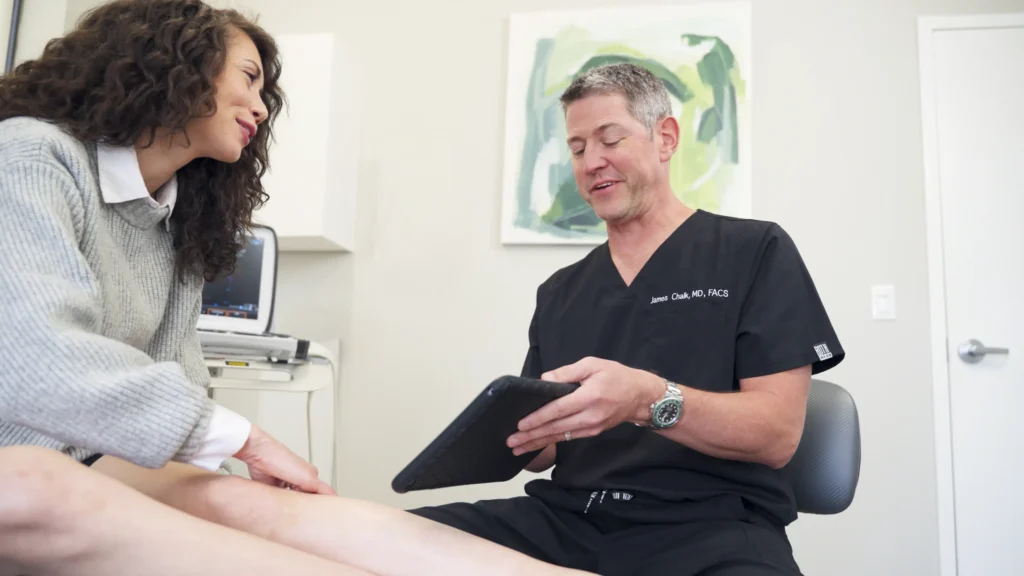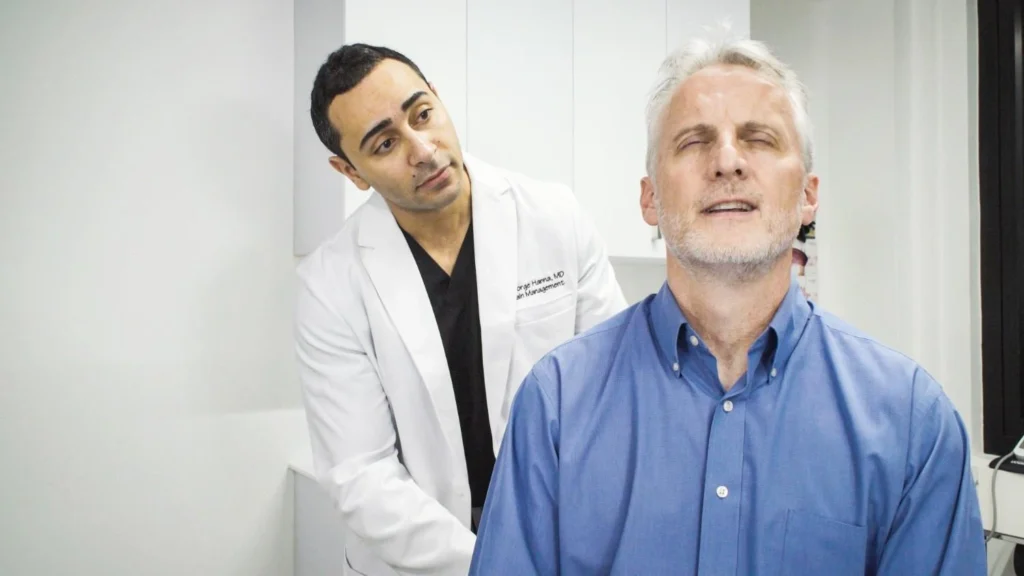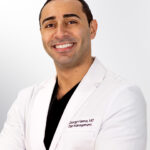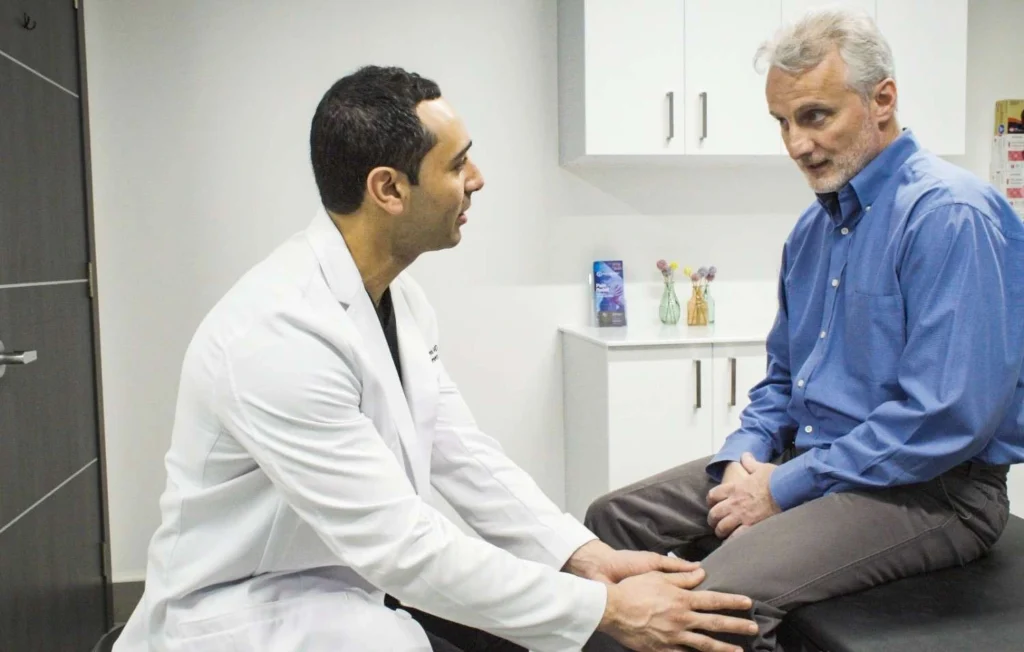Introducing the Best Vein Doctors in NJ
The Spider Vein and Varicose Vein Clinic has some of the best vein specialists in New Jersey. We individually select our vein doctors from the country’s best medical institutions, such as Yale Medical School, residency programs, and fellowships. Furthermore, our vein doctors undergo board certification from the American Board of Venous and Lymphatic Medicine, officially establishing themselves as the country’s leading vein experts. Furthermore, we ensure that all our vein doctors specialize in vascular imaging and the latest minimally invasive spider vein and varicose vein treatments.
Our spider vein and varicose vein clinics in New Jersey are led by two exceptional vein doctors — Dr. Sareh Rajaee and Dr. Todd Kobrinski. You can find them at our vein clinics in Clifton, Paramus, or Woodland Park.
- The Clifton vein clinic is at 1117 US-46 Suite 205, right off NJ-3.
- The Paramus vein clinic is at 140 NJ-17 #103, just off garden state parkway.
- The Woodland Park vein clinic is at 1167 McBride Ave Suite 2, near the Garden State Plaza.
You can schedule an appointment with our vein doctors in NJ online or call +1 201-485-5020. Below, we provide an overview of our vein doctors’ credentials, followed by the qualities to consider when looking for vein specialists.

Dr. Todd Kobrinski
- Specialist in venous medicine and cardiovascular disease
- Bachelor’s and Master of Science degrees from The George Washington University
- Medical degree from Nova Southeastern University in Florida
- Post-graduate training through the Icahn School of Medicine at Mount Sinai St. Luke’s Roosevelt Hospital Center in New York City — three years of residency in Internal Medicine and five years of fellowships in Cardiovascular Disease and Clinical Cardiac Electrophysiology
- Published in the American Journal of Cardiology and the American College of Cardiology Scientific Sessions
Dr. Sareh Rajaee
- Medical director at the spider vein and varicose vein clinic in New Jersey
- Specialist in venous medicine and minimally invasive vein treatments
- Board-certified by the American Board of Venous and Lymphatic Medicine
- Double majors in Biomedical Engineering and German from the University of Rhode Island
- Medical doctorate from the Alpert Medical School at Brown University
- Master’s in Public Health at the Harvard School of Public Health
- Vascular Surgery Residency at Yale New Haven Hospital
- Specialized training in open and endovascular procedures
#1. ABVLM Certification
The American Board of Venous and Lymphatic Medicine officially certifies and recognizes vein doctors with stellar contributions to vein care and venous medicine. They only certify the country’s top 1% of vein doctors if they pass a strict set of requirements and challenging tests. Board certification isn’t necessary for vein doctors, but it helps patients distinguish the best vein doctors from the rest.
You should ideally look for ABVLM board-certified vein doctors. To get board-certified, vein doctors must complete their residency and fellowship training in relevant fields, spend several years as vein doctors, and specialize in the latest vein treatment modalities. Furthermore, vein doctors must stay abreast of the latest developments in vein care to retain their certification.
You can rest assured that ABVLM-certified vein doctors are some of the best in the field.
#2. Excellent Credentials
When looking for vein doctors in NJ, you must focus on their credentials. You should ideally look for vein doctors who have graduated from renowned medical schools, such as Harvard Medical School, Yale Medical School, and others of equal repute. They should have also completed their residency programs and fellowships in related fields, such as cardiovascular disease or venous disease. This will help you narrow down the field of potential vein doctors.
#3. Specializing in Vascular Imaging
You must look for vein doctors specializing in vascular imaging tests, a particular skill set that allows vein doctors to diagnose and treat vein problems. Vascular imaging tests, such as duplex ultrasound involve using ultrasound energy to visualize the blood flow in the leg veins. This helps vein doctors diagnose chronic venous insufficiency, the root cause of most vascular problems. Furthermore, ultrasound-guided vein treatments are also safer and more effective.
#4. Specializing in Minimally Invasive Treatments
You must find vein doctors specializing in minimally invasive spider vein and varicose vein treatments — radiofrequency ablation, endovenous laser ablation, venaseal, sclerotherapy, and ambulatory phlebectomy. Minimally invasive procedures are safer and more effective than surgical treatments, they have a negligible risk of complications, and they conclude within an hour with no downtime. If a vein doctor recommends varicose vein surgery, they’re not right for you.
#5. Excellent Bedside Manners
This may seem like a moot point, but you should identify vein doctors with excellent bedside manners. You can generally determine a vein doctor’s attitude during your initial consultation, or you can read their patient testimonials online. Your vein doctor must take the time to understand your unique symptoms and goals, concerns, and medical history, which helps them curate personalized vein treatment plans. They must also ensure your treatments are physically and emotionally comfortable.
#6. Hassle-free Insurance Verification
Your vein doctor must accept all major insurance plans, including Medicare, because most vein treatments are covered by insurance if you have chronic venous insufficiency. Furthermore, the vein doctor should also provide hassle-free insurance verification, which allows you to determine your out-of-pocket financial cost before the procedure. The vein clinic must actively help with insurance coverage.
#7. Complete Transparency
You should find a vein doctor who values complete transparency. This means they should discuss all of your vein treatment options, including their pros, cons, risks, and costs, helping you make an informed decision. They must also provide an overview of your vein treatment costs, with or without insurance coverage, before your procedure. You should know exactly what you’ll have to pay later.





